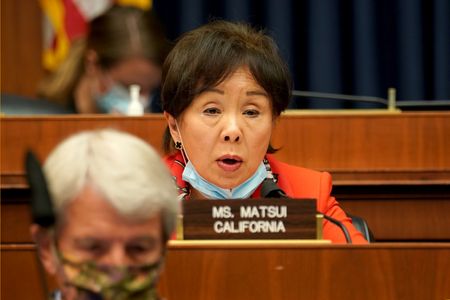By David Shepardson
WASHINGTON (Reuters) – A bipartisan group of more than 140 U.S. lawmakers on Tuesday urged leaders in Congress to approve $52 billion in government subsidies for semiconductor chips production and research.
The U.S. House of Representatives on Feb. 4 narrowly passed a bill aimed at increasing American competitiveness with China in part by allocating $52 billion to boost U.S. semiconductor manufacturing.
The funding will “help prevent future shortages that cause GDP drag, job losses, more expensive consumer goods, and national security vulnerabilities,” said a letter https://matsui.house.gov/sites/evo-subsites/matsui.house.gov/files/evo-media-document/20220308%20-%20CHIPS%20letter_0.pdf signed by lawmakers, including Representative Doris Matsui and Senator Mark Warner, both Democrats, and Republican Representative Michael McCaul and Senator John Cornyn.
The lawmakers urged Speaker Nancy Pelosi, Majority Leader Chuck Schumer, Minority Leader Mitch McConnell and House Minority Leader Kevin McCarthy to “immediately begin negotiations to allow votes in the House and Senate as soon as possible.”
President Joe Biden is set to hold an event on semiconductor chips on Wednesday to meet with business leaders and again push for quick passage.
Last month, 22 governors also urged quick action on chips funding.
A persistent industry-wide shortage of chips has disrupted production in the automotive and electronics industries, forcing some firms to scale back production.
The Senate voted 68-32 to pass its own bill in June, which includes $52 billion for chips and authorizes $190 billion for U.S. technology and research to compete with China.
The funding includes $2 billion to incentivize production of “mature node” semiconductors used by the auto industry and in medical devices, agricultural machinery and some national defense applications.
There are key differences on China provisions in both bills.
The House bill includes a number of trade provisions and would impose additional sanctions on China for its treatment of Uyghurs and offer refugee status for qualifying Hong Kongers.
The House measure reauthorizes and revises Trade Adjustment Assistance programs, which help workers whose jobs or pay is hurt by imports, and reforms the Generalized System of Preferences, a preferential tariff system for imports.
(Reporting by David Shepardson; Editing by Chris Reese and Aurora Ellis)














